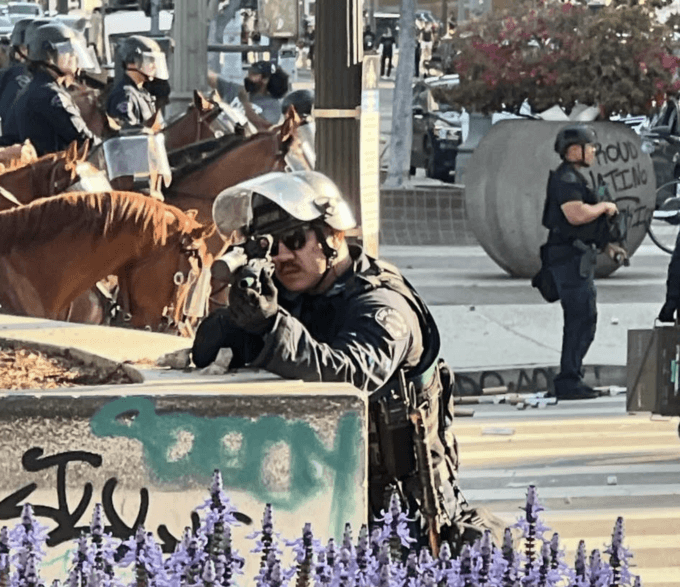
Image by Ted Griswold.
Donald Trump’s deployment of federal troops to Los Angeles represents a new and dangerous phase for American democracy. His actions should be taken as a warning sign of the authoritarian streak within the current U.S. president. This development further shows his lack of commitment to democratic norms and criticism, and his desire to use confrontational and highly visible tactics to intimidate.
While there is broad public support in the U.S. for addressing illegal immigration, most Americans do not approve of the confrontational tactics the Trump administration has used. Under Bush, Obama, and Biden, deportation efforts were carried out with more discretion and coordination. And also, they deported more individuals than Trump.
Never forget that Trump is a showman, using tactics like that in LA in order to grab media attention, flood the news cycle, and divert attention away from his administration’s kleptocracy and the damage the Big Beautiful bill will wreck upon America, especially the poor.
Trump has chosen to focus on high-profile areas, particularly in states and cities where his political support is weak. Los Angeles, California, a city and state that have consistently opposed Trump politically, became a focal point. It is not just about immigration; it is about squashing political opposition.
California has a high percentage of immigrants, many of whom are from South America and may be undocumented. The tactics used in the Los Angeles raids seemed designed to intimidate the Latino immigrant community but also Democrats and all opposition. In response, residents organized demonstrations and blockades to resist the federal government’s actions. Rather than de-escalate, the Trump administration doubled down in ways that are both illegal and unconstitutional.
Freedom of speech and the right to assembly protect citizens’ ability to protest government actions, provided they do not obstruct law enforcement. The administration should have informed state and local authorities of its intentions when it first did the raid—this is standard protocol. Instead, the raid came as a surprise. When protests emerged, federal officials failed to consult with California and Los Angeles leaders on how to proceed.
Rather than coordinate with local officials, the administration called out the National Guard and eventually deployed U.S. military forces. This approach was highly unusual and likely illegal. U.S. law dating back to the 1870s—the Posse Comitatus Act—prohibits the use of the military for domestic policing. The last exception occurred in the 1990s, after the Rodney King verdict, but that was done in coordination with California’s governor.
The National Guard is generally controlled by state governors and deployed for natural disasters such as floods, earthquakes, and other emergencies. The president can only mobilize the National Guard for national security threats, usually abroad. However, Trump invoked emergency powers granted by Congress and declared that an insurrection was underway. This allowed him to activate the Insurrection Act, a rarely used and highly controversial statute from the early 19th century.
Trump’s use of emergency powers and the Insurrection Act is extraordinary and currently faces legal challenges. The broader pattern suggests an authoritarian impulse that departs from democratic norms. For those who lived or do live under authoritarian rule, Trump’s tactics are familiar. His actions in Los Angeles mirror his global approach to foreign policy—marked by disregard for democratic principles and dissent.
These developments should concern not only Americans but also those across the globe. Trump’s domestic deployment of military power raises doubts about the United States’ role in defending democracy abroad. If America abandons its democratic ideals at home, its credibility in opposing authoritarianism elsewhere is diminished. What happens in Los Angeles could echo far beyond U.S. borders.
The post Trump’s Escalation appeared first on CounterPunch.org.